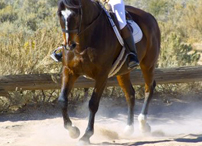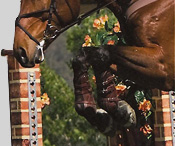



WEIGHT REDUCTION
FOR THE OVERWEIGHT HORSE
An American Association of Equine Practitioners Publication

10 Tips for Weight Reduction
in the Overweight Horse
As a horse owner, you play an important role in controlling your equine companion’s weight. Sound nutrition management, a regular exercise program and veterinary care are key to keeping your horse fit and healthy. Maintaining the ideal weight is not always easy, however.
When implementing a weight loss program for the overweight horse, it’s important to do it gradually and under the supervision of an equine veterinarian. Follow these guidelines from the American Association of Equine Practitioners (AAEP) to get you started:
- Be patient. Weight reduction should be a slow, steady process so not to stress the horse or create metabolic upsets.
- Make changes in both the type and amount of feed gradually. Reduce rations by no more than 10% over a 7- to 10-day period.
- Track your horse’s progress by using a weight tape. When the horse’s weight plateaus, gradually cut back its ration again.
- Step up the horse’s exercise regimen. Gradually build time and intensity as the horse’s fitness improves.
- Provide plenty of clean, fresh water so the horse’s digestive and other systems function as efficiently as possible and rid the body of metabolic and other wastes.
- Select feeds that provide plenty of high quality fiber but are low in total energy.
- Measure feeds by weight rather than by volume to determine appropriate rations.
- Select feeds that are lower in fat since fat is an energy-dense nutrient source.
- Switch or reduce the amount of alfalfa hay feed. Replace with a mature grass or oat hay to reduce caloric intake.
- Feed separate from other horses so the overweight horse doesn’t have a chance to eat his portion and his neighbor’s too.
- In extreme cases of obesity, caloric intake may also need to be controlled by limiting pasture intake.
- Balance the horse’s diet based on age and activity level. Make sure the horse’s vitamin, mineral and protein requirements continue to be met.
For more information about caring for the obese horse, ask your equine veterinarian for the “Overweight Horse” brochure, provided by the American Association of Equine Practitioners in partnership with Educational Partners Bayer Animal Health and Purina Mills, Inc., or visit the AAEP’s horse health web site, www.myHorseMatters.com.
Reprinted with permission from the American Association of Equine Practitioners.
If you have any questions about this article or about how to reduce your horse's weight please contact your veterinarian at 775-969-3495.
PO BOX 60730
RENO NV 89506
EMERGENCY (775) 742-2823 OFFICE (775) 969-3495
FAX (775) 969-3923





